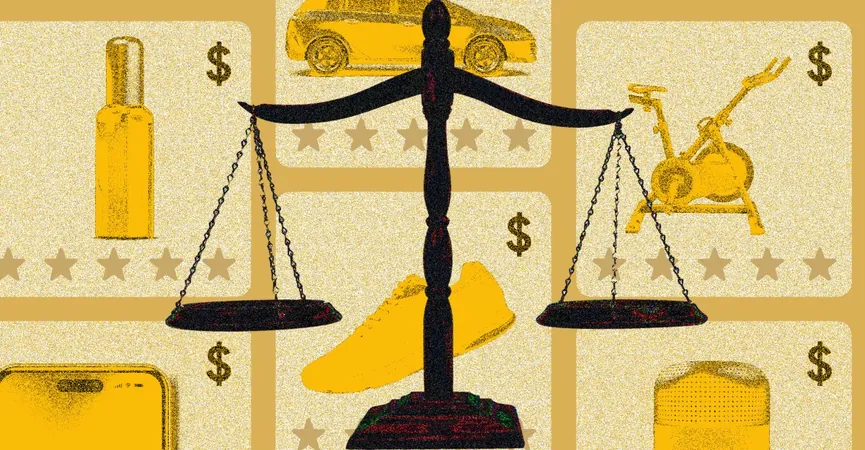
Google's Fierce Fight for the Internet's Financial Backbone Begins
2025-09-23
Author: Michael
In a high-stakes legal showdown, Google stands accused of maintaining an illegal monopoly in the ad tech sector, threatening the very foundation of the open internet, as the Justice Department laid out in court this week.
During the opening arguments of the US v. Google trial, DOJ attorney Julia Tarver Wood invoked Winston Churchill, cautioning that failure to learn from history could lead to disastrous consequences. She argued that a complete breakup of Google is essential to curtail its overwhelming advantages in the ad tech market.
The Government's Bold Demands
The government is pushing for a seismic shift in how Google operates its advertising products. They are specifically calling for Google to divest its AdX exchange, a critical platform for publishers to connect with advertisers, and to open source the auction mechanisms of its Publisher ad server, DoubleClick for Publishers (DFP). This is aimed at shedding light on the opaque processes that currently favor Google.
In counterargument, Google’s attorney Karen Dunn labeled the government's approach as radical and reckless, suggesting that rather than reforming their practices, the DOJ's plan would effectively eliminate Google from the online ad landscape entirely.
What's at Stake for Publishers?
The stakes couldn't be higher. Andrew Casale, CEO of ad exchange Index Exchange, expressed that Google’s DFP is akin to the "unofficial currency of the internet," critical for keeping web content accessible and free for users. The DOJ emphasized that Google’s monopoly has strangled competition and left publishers with no choice but to rely on their services.
Witnesses revealed that Google wields so much power over publishers that it refuses to negotiate contract terms, stifling fair competition. Grant Whitmore, from Advance Local, highlighted the pressure publishers face to accept unfavorable agreements to gain access to advertisers through Google.
The Need for Change
Many in the industry are calling for immediate changes. Whitmore argued for a quicker spin-off of DFP rather than waiting for potential reforms. He stated that Google has consistently demonstrated its ability to adapt in a way that keeps it ahead of competitors, underscoring the call for external oversight on Google's operations.
The DOJ remains skeptical of Google's proposed solutions, asserting that they leave too much room for deceptive practices, likening them to mere band-aids on a far more severe issue.
Competing Narratives in the Courtroom
Adding complexity to the case, Google had recent judicial success when a judge declined to impose similar breakups in a separate antitrust case regarding its search monopoly. Google’s team argued for restraint in this ad tech case, citing risks associated with aggressive judicial remedies that could disrupt their ability to innovate.
AI technologies also cast a shadow over the proceedings, with the government acknowledging their role in evolving the ad market but maintaining that the basic issues of competitive fairness remain unchanged.
Conclusion: A Critical Point for the Open Internet
As the court considers the ramifications of Google’s dominance, the DOJ insists that strong remedies, potentially including a breakup, are essential for revitalizing competition in the ad tech sector. In the words of Wood, "Without that, your honor, what was it all for?" The outcome of this trial could significantly reshape the landscape of online advertising and, by extension, the future of free content on the internet.









 Brasil (PT)
Brasil (PT)
 Canada (EN)
Canada (EN)
 Chile (ES)
Chile (ES)
 Česko (CS)
Česko (CS)
 대한민국 (KO)
대한민국 (KO)
 España (ES)
España (ES)
 France (FR)
France (FR)
 Hong Kong (EN)
Hong Kong (EN)
 Italia (IT)
Italia (IT)
 日本 (JA)
日本 (JA)
 Magyarország (HU)
Magyarország (HU)
 Norge (NO)
Norge (NO)
 Polska (PL)
Polska (PL)
 Schweiz (DE)
Schweiz (DE)
 Singapore (EN)
Singapore (EN)
 Sverige (SV)
Sverige (SV)
 Suomi (FI)
Suomi (FI)
 Türkiye (TR)
Türkiye (TR)
 الإمارات العربية المتحدة (AR)
الإمارات العربية المتحدة (AR)